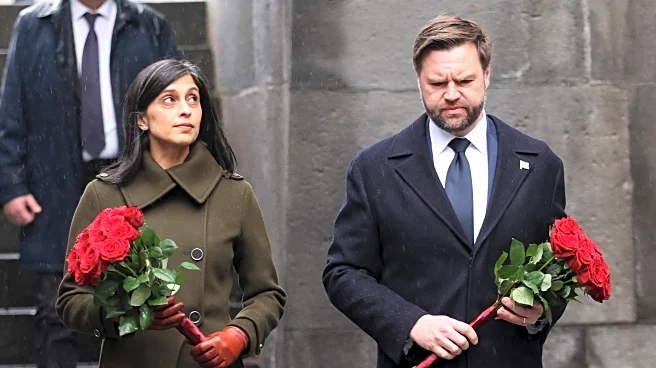What's Happening?
Israeli officials have accused Hamas of violating a ceasefire agreement by failing to return the remains of IDF officer Lt. Hadar Goldin, who was killed and abducted in Gaza over 11 years ago. Hamas claimed
to have located Goldin's remains in a tunnel in Rafah but has not handed them over. The Israeli government views this delay as a serious breach of the agreement and demands the immediate return of Goldin's body. The situation is complicated by Hamas's attempts to negotiate the release of its operatives trapped in Rafah, with proposals failing to reach a resolution. IDF Chief of Staff Lt. Gen. Eyal Zamir has stated there will be no deal, emphasizing that the trapped terrorists will either be eliminated or surrender.
Why It's Important?
The ongoing dispute over Goldin's remains underscores the fragile nature of ceasefire agreements and the complexities of negotiating with militant groups. This situation has significant implications for Israeli-Palestinian relations, potentially affecting future peace negotiations and regional stability. The refusal to return Goldin's body may exacerbate tensions between Israel and Hamas, impacting security dynamics in the region. The Israeli government's firm stance reflects its commitment to recovering fallen soldiers, which is a sensitive and emotional issue for the nation.
What's Next?
The Israeli government is likely to continue pressing for the return of Goldin's remains, potentially escalating diplomatic and military efforts to resolve the situation. The international community may become involved in mediating the dispute, seeking a resolution that satisfies both parties. The outcome of this situation could influence future ceasefire agreements and negotiations between Israel and Hamas.
Beyond the Headlines
The ethical and humanitarian aspects of recovering the remains of fallen soldiers highlight the broader challenges of conflict resolution and reconciliation. This situation raises questions about the use of human remains as leverage in negotiations, which can have profound cultural and moral implications. The international community may need to address these issues to ensure that peace efforts are conducted with respect for human dignity.










